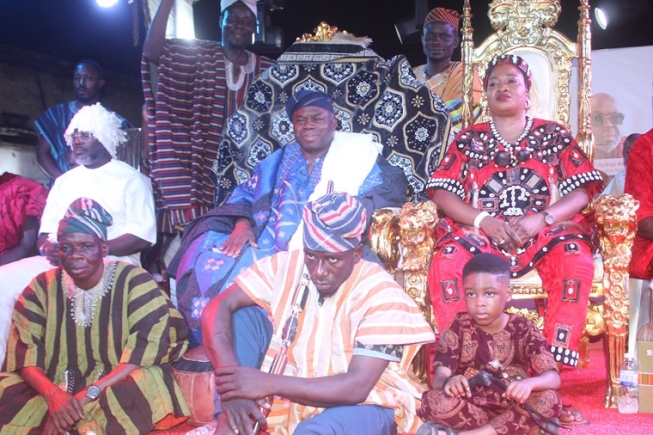A gathering of traditional rulers climaxed the Homowo Festival of the chiefs and people of the Asere, Amartse We Traditional Area of the Ga State, in the Greater Accra Region as they marked the annual traditional feast last Saturday.
The celebration at the Family house, Bukom Maamorna, led by the Queen Mother of Asere Amartse We, Naa Amorkor Shika Futru I, drew a distinguished gathering of royalty, community leaders, religious leaders and residents of Asere, Amartse We, reflecting their rich cultural heritage and unity of purpose.
In attendance were the Nae Wulormo, Nuumo Akwaa Mensah III; Kaneshie Mantse, Nii Ayitey Kane I; Head of Family, Nii Ashorng Amarkwei III; Faana Jasetse, Nii Ashong Amartey Nkpa; Ga Wolartse, Nii Abeo Kyerekuanda V, and others.
The Pishigu Lana and Paramount Chief of the Pishigu Traditional Area in Dagbon, Naa Dr Andani Alhassan, attended as a special guest.
Background
Homowo, which refers to hooting at hunger, commemorates the period of abundance that followed a spell of famine as experienced by the ancestors of Ga.
The festival serves as a time for the community to honour its rich history, culture and unity, reaffirming the Ga people s cultural identity and resilience in the face of modern challenges.
Naa Shika Futru s involvement in this year’s Homowo celebrations highlighted the significance of her leadership within the Ga traditional space after she was enstooled in April 2023 and unveiled in February this year.
Rationale
In her address, Naa Shika Futru said there was the need to create a conducive environment for the youth, saying this day is not just a festivity but a strategic initiative to foster unity and peace within the community, particularly among the youth.
The festival, she said, was to bridge gaps among the youth, and create a supportive environment for their personal and communal growth, adding that to gain the youth’s trust, you need to build it”.
She encouraged the youth to take pride in their cultural heritage and uphold the values of the Ga people.
“Our ancestors overcame great challenges for our survival and prosperity. It is our duty to preserve and pass on this legacy to future generations,” she added.
Naa Shika Futru stressed the crucial role of women in maintaining Ga cultural traditions and urged them to continue to nurture the younger generation.

Concerns
Naa Shika Futru expressed concern about rising crime, and juvenile delinquency in the community, and attributed these issues to widespread youth unemployment.
She called for well-structured youth development and empowerment programmes with active stakeholder support.
The Amartse-We Queen Mother advised the youth to embrace their culture, keep an open mind, seek growth, and engage with elders for guidance.
She also thanked the Pisuga leadership for their support in strengthening the community, stating: “The success of the community is not only due to the Ga people’s efforts but also to the contributions of other tribes”.
Mutual Relations
Naa Dr Alhassan affirmed the commitment to build strong relations with the Amartse-We clan and the Ga State.
He said: “We want to show the Ga State that despite our tribal differences, we share a rich history and culture, which should be the basis of our existence .
Naa Dr Alhassan said ancestral moral values and traditions should guide the community’s development amid modernity.
He, therefore, called for urgent attention from traditional rulers across the country to address youth deviance, with a focus on providing employable skills and opportunities.

Education
Nii Ashong Amarkwei expressed concern about high illiteracy, teenage marriages, and indiscipline among the youth, which he attributed to limited exposure and opportunities within the community.
He said the “Girl Power Project” campaign initiated by the Amartse-We Manye aimed to improve living standards through education and training of girls especially.
As the Homowo continued, he said, the clan would host a family gathering to resolve misunderstandings and conflicts among the people.
He said despite efforts to reconcile the people, tensions remained unresolved.
Nii Ashong Amarkwei, however, stressed that education remained the key to changing attitudes and fostering understanding within the community.
Source: www.graphic.com.gh


